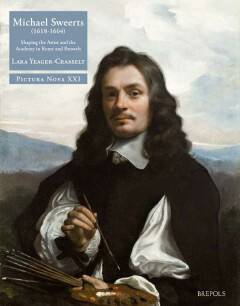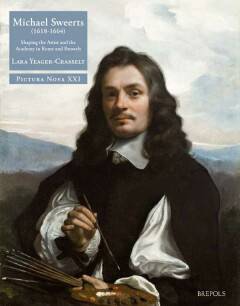
Bedankt voor het vertrouwen het afgelopen jaar! Om jou te bedanken bieden we GRATIS verzending (in België) aan op alles gedurende de hele maand januari.
- Afhalen na 1 uur in een winkel met voorraad
- In januari gratis thuislevering in België
- Ruim aanbod met 7 miljoen producten
Bedankt voor het vertrouwen het afgelopen jaar! Om jou te bedanken bieden we GRATIS verzending (in België) aan op alles gedurende de hele maand januari.
- Afhalen na 1 uur in een winkel met voorraad
- In januari gratis thuislevering in België
- Ruim aanbod met 7 miljoen producten
Zoeken
Michael Sweerts (1618-1664)
Shaping the Artist and the Academy in Rome and Brussels
Lara Yeager-Crasselt
€ 159,00
+ 318 punten
Omschrijving
The Flemish artist Michael Sweerts has long been considered one of the most fascinating and enigmatic painters of the seventeenth century. His peripatetic career, which stretched from his native Brussels to Rome, and later Amsterdam and the Far East, included work for the papal family and the foundation of a drawing academy in the Southern Netherlands. Despite this rich and varied career, Sweerts has yet to be fully examined within the artistic, intellectual and cultural contexts of Brussels and Rome in the seventeenth century. This book aims to retrace the artistic traditions that shaped Sweerts' development and evolution as a painter, etcher and teacher, firmly situating him at the crossroads of artistic exchange between the Netherlands and Italy. The author demonstrates how Sweerts responded to contemporary notions of artistic practice and pedagogy in his work, and how he played a critical role in the formation of a Netherlandish academic tradition. Approaching Sweerts from these new perspectives, this book examines the classicizing and artistic contexts of Brussels as a center of tapestry production, and reconstructs Sweerts' familial and social networks in the Netherlands and Rome. The artist emerges as a sophisticated figure amongst his contemporaries, including the French painter Nicholas Poussin (1594-1665), his patron, Camillo Pamphilj (1622-1666), nephew of Pope Innocent X, and the Flemish sculptor Francois Duquesnoy (1597-1643). Alongside a consideration of his sensitive scenes of peasants and artists in Rome's urban landscape and strikingly life-like portraits and head studies, Sweerts' remarkable depictions of artists learning and practicing their profession are contextualized within the evolving conceptions of the academy in the early modern period. The author provides the first inclusive investigation of the artistic and socioeconomic frameworks that surrounded Sweerts' establishment of a drawing academy for artists and tapestry designers in Brussels in the 1650s. She brings to light the academy's significance as a site of artistic learning and innovation, and the importance of working directly from life, while ultimately redefining Sweerts' place in the history of Flemish art.
Specificaties
Betrokkenen
- Auteur(s):
- Uitgeverij:
Inhoud
- Aantal bladzijden:
- 340
- Taal:
- Engels
- Reeks:
- Reeksnummer:
- nr. 21
Eigenschappen
- Productcode (EAN):
- 9782503555300
- Verschijningsdatum:
- 29/02/2016
- Uitvoering:
- Hardcover
- Formaat:
- Genaaid
- Afmetingen:
- 226 mm x 287 mm
- Gewicht:
- 1723 g

Alleen bij Standaard Boekhandel
+ 318 punten op je klantenkaart van Standaard Boekhandel
Beoordelingen
We publiceren alleen reviews die voldoen aan de voorwaarden voor reviews. Bekijk onze voorwaarden voor reviews.









